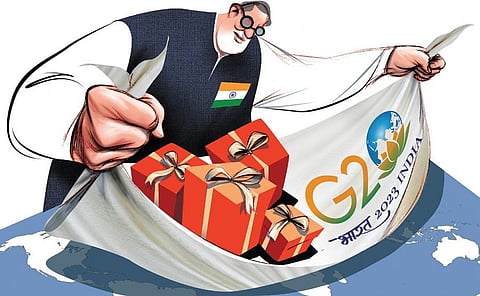

G20 took the world by storm. The group had perhaps never witnessed the sort of commitment that India displayed. A couple of things characterised the country’s presidency. All stops were pulled out to prepare. And each working sub-group had specially appointed government functionaries who were redeployed from their normal duties.
The appointment of Amitabh Kant, former CEO of Niti Aayog, as India’s Sherpa, conveyed the right message. He has the correct mix of diplomatic savvy and knowledge of social and economic issues. For the over 200 meetings spread across 60 locations, one lakh delegates travelled to different corners of the country. While visiting the Corbett National Park, I was surprised to know that hectic preparations were underway for the G20 Chief Science Advisers Roundtable at faraway Ramnagar in Uttarakhand.
India introduced a working group that established disaster risk resilience (DRR) as the latest domain for review and action. There was a dire requirement for DRR on the G20 agenda because climatic disasters have been on the rise. The group had committed to mitigate related threats. Acts like these have helped improve India’s stature in the international community.
It is not just a stroke of luck that India’s economic parameters simultaneously witnessed an improvement. The international financial institutions’ estimate of the growth in India’s gross domestic product has been assessed to be on an upward spiral, contributing to the positive perception around the world. The abysmal state we had sunk to during the pandemic now seems like a distant past. The organisational capability on display—although it drew some criticism about the national capital’s virtual lockdown—helped boost the image about India’s capability to host big events. This comes not too long before a potential bid to host the Olympic Games.
The purpose of summarising the achievements is simply to reflect on issues that routinely escape the rationale of the nation’s strategic confidence, and how it can support India’s geopolitical cause. The slogan One Earth, One Family, One Future was appealing, human and appropriate.
The entry of the African Union (AU) as the 21st member of G20 was a historic moment. Although efforts towards such an inclusion had started before India’s presidency, our prioritisation of the AU created the right sensitivity. The induction, which was graciously conducted, set the tone for the summit. It also symbolised India’s support for the Global South. This was a major agenda throughout the summit and in the events leading up to it. This move should help save the AU from debt traps and resource extraction by richer nations.
The Indian push to prioritise economic issues got a boost. This helped the country become a leading voice of the Global South. The other field in which India succeeded in conveying its message of capability is digital public infrastructure. The nationwide success of Aadhaar and the United Payments Interface (UPI) has received global attention. There is enough demand for facilitating such capabilities in both advanced and developing countries. As Indians, we can be proud of no longer being a cash-intensive economy.
India did well to exploit the opportunities of the numerous side meetings, which proved as important as the main summit. The flagship initiative here appeared to be the India-Middle East-Europe corridor, a trade link-up countering China’s Belt and Road Initiative. The concept is ambitious and if successfully implemented, India’s amicable relationship with the Gulf nations will be strengthened. It will also bring Europe and the US back to the Middle East in a more decided way, apart from giving greater legitimacy to the India-Israel-US-UAE grouping and preventing China’s footprint from getting stronger after the Saudi-Iran deal that it brokered. The importance of the Middle East can never be undervalued and the measures initiated during the summit will further the relationships Prime Minister Narendra Modi has tried to develop since 2014.
That the India-Saudi relationship continues to flower was evident from the state visit of Crown Prince Mohammed bin Salman immediately after the summit. His approach throughout has been supportive of India. The changing internal environment of his country will place it in the limelight, and the moderate ideology flowing from the royal court will hopefully trigger the reforms sought by well-wishers. This should, over time, ease many issues in the Islamic world and heal its relations with others.
Even without the presence of the Russian and Chinese heads of State, the Ukraine war was a sticky issue at the G20. The consensus declaration deliberately remained well short of berating Russia and China. The inclusion in the communique of PM Modi’s message to President Vladimir Putin, “this is not the season for war”, was also appropriate.
The attendance of Xi Jinping and Vladimir Putin at these important events would have probably increased the stature of the summit. However, the stand-in representatives of China and Russia played a non-abrasive and low-key role, giving India more strategic space. But a negative perception that arose from this was that the summit was dominated by the West, with India more closely linked with that grouping.
Since the commencement of the Ukraine war, India has managed to maintain an equal distance from the US and NATO on the one hand, and the Sino-Russian bloc on the other. Although it remains a strategic partner of the US, India could find its relationship with both Russia and China getting strained, and this could challenge its presence in the Shanghai Cooperation Organisation and the Russia-India-China forum.
India’s perception about the importance of Bangladesh was also well projected. By inviting Prime Minister Sheikh Hasina, India has appropriately messaged that the Bangla nation continues to have a very high strategic importance in the region. With elections in Bangladesh drawing close, India must support democracy in the neighbouring country.
With time, further realisation of what was achieved at the G20 summit in 2023 will dawn, perhaps setting a precedent for the functioning of multilateral groupings.
Lt Gen Syed Ata Hasnain (Retd)
Former Commander, Srinagar-based 15 Corps. Now Chancellor, Central University of Kashmir